

Cognitive Biases and the Human Brain. I am staring at a photograph of myself that shows me 20 years older than I am now. I have not stepped into the twilight zone. Rather, I am trying to rid myself of some measure of my present bias, which is the tendency people have, when considering a trade-off between two future moments, to more heavily weight the one closer to the present. A great many academic studies have shown this bias—also known as hyperbolic discounting—to be robust and persistent. To hear more feature stories, see our full list or get the Audm iPhone app.
Most of them have focused on money. Present bias shows up not just in experiments, of course, but in the real world. Above the Market. Everybody who gets married expects the marriage to work out.

“You don’t ever think you’ll be apart,” Clueless actress Alicia Silverstone explained, after filing for divorce. Otherwise, why get married? As Robert De Niro proclaims in the opening voice-over to Martin Scorsese’s Casino: “When you love someone, you’ve gotta trust them. Five Features of Better Arguments. The Rules of Engagement in Controversial Discourse. 1.
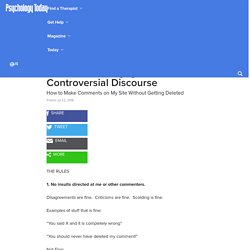
No insults directed at me or other commenters. Disagreements are fine. Criticisms are fine. Varieties Of Argumentative Experience. In 2008, Paul Graham wrote How To Disagree Better, ranking arguments on a scale from name-calling to explicitly refuting the other person’s central point.
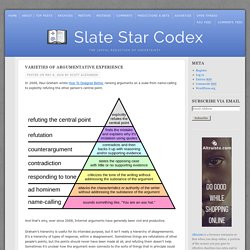
And that’s why, ever since 2008, Internet arguments have generally been civil and productive. Graham’s hierarchy is useful for its intended purpose, but it isn’t really a hierarchy of disagreements. It’s a hierarchy of types of response, within a disagreement. Sometimes things are refutations of other people’s points, but the points should never have been made at all, and refuting them doesn’t help. Theconversation. Currently, there are three important issues on which there is scientific consensus but controversy among laypeople: climate change, biological evolution and childhood vaccination.
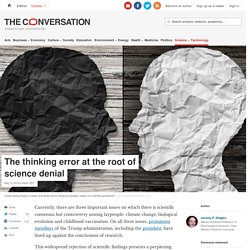
On all three issues, prominent members of the Trump administration, including the president, have lined up against the conclusions of research. This widespread rejection of scientific findings presents a perplexing puzzle to those of us who value an evidence-based approach to knowledge and policy. Yet many science deniers do cite empirical evidence. The problem is that they do so in invalid, misleading ways. Psychological research illuminates these ways. How to Disagree. March 2008 The web is turning writing into a conversation.

Twenty years ago, writers wrote and readers read. The web lets readers respond, and increasingly they do—in comment threads, on forums, and in their own blog posts. The Psychology of Thinking - with Richard Nisbett. The Crucial Thinking Skill Nobody Ever Taught You – The Mission. How Great Thinkers Shatter the Status Quo The German mathematician Carl Jacobi made a number of important contributions to different scientific fields during his career.
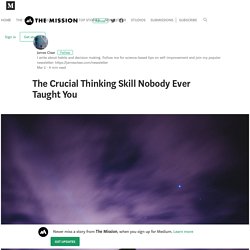
In particular, he was known for his ability to solve hard problems by following a strategy of man muss immer umkehren or, loosely translated, “invert, always invert.” Jacobi believed that one of the best ways to clarify your thinking was to restate math problems in inverse form. He would write down the opposite of the problem he was trying to solve and found that the solution often came to him more easily. Inversion is a powerful thinking tool because it puts a spotlight on errors and roadblocks that are not obvious at first glance. Great thinkers, icons, and innovators think forward and backward. Great thinkers, icons, and innovators think forward and backward. Art provides a good example. Nirvana turned the conventions of mainstream rock and pop music completely upside down.
Proximate vs Root Causes: Why You Should Keep Digging to Find the Answer. “Anything perceived has a cause.All conclusions have premises.
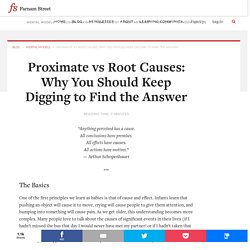
All effects have causes. All actions have motives.” — Arthur Schopenhauer The Basics. How To Improve Your Thinking: Charlie Munger vs. Ray Dalio. Two modern-day business titans — Ray Dalio and Charlie Munger — have a lot in common.
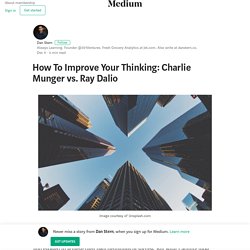
They run massive billion dollar businesses. They’ve constantly adapted and evolved to achieve their own definitions of success. But what I admire most about Ray and Charlie? They thoughtfully share the keys to their success in the form of helping others to think objectively, make decisions, and acquire knowledge. Even more impressive, you’ll notice that their methods of thinking yield different perspectives that arrive at the same conclusions. Open mindedness. Future - Why are people so incredibly gullible? If you ever need proof of human gullibility, cast your mind back to the attack of the flesh-eating bananas.
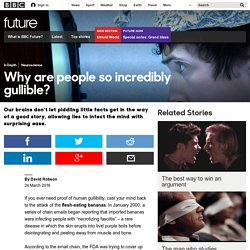
In January 2000, a series of chain emails began reporting that imported bananas were infecting people with “necrotizing fasciitis” – a rare disease in which the skin erupts into livid purple boils before disintegrating and peeling away from muscle and bone. According to the email chain, the FDA was trying to cover up the epidemic to avoid panic. Faced with the threat, readers were encouraged to spread the word to their friends and family. The threat was pure nonsense, of course.
Every Single Cognitive Bias in One Infographic. View the high resolution version of today’s graphic by clicking here.
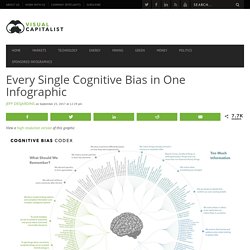
Leaving Facebook. Robb Willer: How to have better political conversations. Why Is It So Hard to Change People’s Minds? It’s probably happened more than once: You spend a lot of time trying to convince someone that their opinion on a particular issue is wrong. You take pains to make sure your argument is air-tight. But instead of coming around to your point of view, your conversation partner pushes back, still convinced of her ultimate rightness. “What do you mean poor people need social programs? They have the same opportunities as everyone else!” By the end of your debate, you’re faced with the same stalemate you had at the beginning—and your relationship may be feeling the strain. Compress to impress. Cookies are Not Accepted - New York Times. The data suggests that young women use the phrase slightly more often than men, but in my own classes, male students begin almost every statement with “I feel like.”
The gender gap is vanishing because the cultural roots of this linguistic shift were never primarily a consequence of gender. Mental Models and Reasoning Lab. Mental models Mental models are psychological representations of real, hypothetical, or imaginary situations. They were first postulated by the American philosopher Charles Sanders Peirce, who postulated (1896) that reasoning is a process by which a human “examines the state of things asserted in the premisses, forms a diagram of that state of things, perceives in the parts of the diagram relations not explicitly mentioned in the premisses, satisfies itself by mental experiments upon the diagram that these relations would always subsist, or at least would do so in a certain proportion of cases, and concludes their necessary, or probable, truth.”
The rise and fall and rise of logic. The history of logic should be of interest to anyone with aspirations to thinking that is correct, or at least reasonable. This story illustrates different approaches to intellectual enquiry and human cognition more generally. Theconversation. Why Facts Don’t Change Our Minds. In 1975, researchers at Stanford invited a group of undergraduates to take part in a study about suicide. The Map is Not the Territory. “(History) offers a ridiculous spectacle of a fragment expounding the whole.” — Will Durant in Our Oriental Heritage “That’s another thing we’ve learned from your Nation,” said Mein Herr, “map-making.
But we’ve carried it much further than you. What do you consider the largest map that would be really useful?” How to Think Like Shakespeare - The Chronicle of Higher Education. To tell someone they're wrong, first tell them how they're right — Quartz. The 17th century philosopher Blaise Pascal is perhaps best known for Pascal’s Wager which, in the first formal use of decision theory, argued that believing in God is the most pragmatic decision. The Questions That Matter. The Questions That Matter. The Tyranny of Facts: Being “Right” is Not Enough. Uk.businessinsider.
Brian Christian: Algorithms to Live By. Why You Can't Change People's Minds With Facts. The Value of Grey Thinking. Mastering the Art of Communication: What Big Data Can Tell Us. Why "scout mindset" is crucial to good judgment. How to win a Facebook argument, according to science. Want to Be Extraordinarily Persuasive? Start by Banning These 3 Weak Words. Don’t Get "Should" Mixed Up with "Is" A Cambridge professor on how to stop being so easily manipulated by misleading statistics. How To Have An Opinion Worth Hearing. Illusory Correlation: How to Spot This Common Mental Error. 3 Types of Questions Smart People Never Ask (and 5 They Do) Keep losing arguments? A psychologist explains why emotions are more persuasive than logic. How to Think Strategically. Rationality. How to Solve Google’s Crazy Open-Ended Interview Questions. Adding Tools to Your Mental Toolbox. How to Think. In Praise of Slowness: Challenging the Cult of Speed.
Mental Models. Rethink Your Thoughts about Thinking. Changing How We Think. Ideology is the Problem. How Bayes’ Rule Can Make You A Better Thinker. Simple Rules: How to Thrive in a Complex World. Daniel Kahneman Explains The Machinery of Thought. Daniel Dennett on Tools To Transform Our Thinking. The Baloney Detection Kit: Carl Sagan’s Rules for Bullshit-Busting and Critical Thinking. Maybe Logic. John Searle on Ludwig Wittgenstein: Section 1. Why Study Logic? Center for Applied Rationality. Socratic Method Research Portal. Training - Encouraging Critical Thinking Online. Where Knowledge, Understanding and Wisdom Begin. Intellectually honest and intellectually dishonest debate tactics. Thou shalt not commit logical fallacies.
An Illustrated Book of Bad Arguments. Logical Fallacies. Taxonomy of the Logical Fallacies. Rhetological Fallacies. The Logical Fallacies: Logical Fallacies. Classical Rhetoric: An Introduction. The Periodic Table of the Figures of Speech: 40 Ways to Improve Your Writing. Avoid Mistakes - Figures of Speech. Silva Rhetoricae: The Forest of Rhetoric. A Handbook of Rhetorical Devices. Metaphor Examples - Example of Metaphor. How To Win Every Argument. How To Win An Argument. A practical guide to countering science denial. The Ten Golden Rules of Argument. How to Criticize with Kindness: Philosopher Daniel Dennett on the Four Steps to Arguing Intelligently.
Why Harvard Destroyed Rhetoric - Figures of Speech. How to Train Your Mind to Think Critically and Form Your Own Opinions. Debating with Knives. What Is Unhealthy Skepticism? - The Epoch Times. The Six Filters for Truth. Julian Treasure: How to speak so that people want to listen. Nancy Duarte: The secret structure of great talks.
``How To Speak and Write Postmodern''